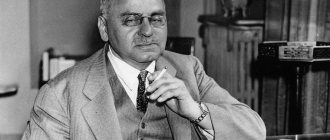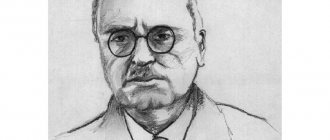Alfred Adler, the son of a Jewish merchant, was born in Vienna on February 7, 1870. Alfred's mother was a wonderful pianist, and Adler himself had an unusually beautiful voice and was often advised to try himself as an opera singer. Alfred Adler suffered many illnesses in childhood, but he was more burdened by the constant rivalry with his older brother. At home he did not feel equality and could not enjoy self-respect. He later reflected the gained experience of struggle in his works, where he emphasized the importance of empathy and common values, calling it a social interest, thanks to which an individual can realize his potential and become a useful member of society [7, 118]. At the age of 18, Alfred entered the University of Vienna to study medicine. At one of the political meetings at the university, he met his future wife Raisa, a Russian student who also studied at the university.
Adler received his medical degree in 1895 and began practicing as an ophthalmologist, but due to his growing interest in nervous system function and adaptation, Alfred retrained in neurology and psychiatry.
In 1901, while defending Freud's book in print, he received a letter of gratitude from Z. Freud and was invited to a discussion group on psychoanalysis.
In 1910, he became president of the Psychoanalytic Society and co-editor of one of the psychological journals. Just a year later, differences in views with Freud were unacceptable to many members of the Society and Freud himself, and Adler resigned as president and left the Society along with nine like-minded people. Subsequently, Adler created his own organization, the Association of Individual Psychology, and this trend spread throughout Europe.
Alfred Adler published many articles and monographs, and also devoted a huge part of his time to lecture tours in Europe and the USA, and was engaged in teaching. In 1932, he left Vienna forever and settled in the United States, heading the department of medical psychology at Long Island Medical College. Adler died in Scotland in 1937, at the age of 67, during a lecture tour in Europe [7, 118].
Basic concepts of Adler's individual psychology
Adler's theory is based on several sources. The theory of evolution of Charles Darwin, the psychoanalytic theory of Z. Freud, the will to power of Nietzsche, the fictional goals of Vaihinger and the theory of holism became especially significant. Adler concentrated his attention on the relationship between the individual and the world around him. The main biological fact for Adler is not the child’s instinctive sexual behavior, but the fact that the child feels small and helpless in the world of adults. According to Adler, children's early attempts to adapt to their environment lead them to develop superiority over others as a way to gain self-esteem and achieve success.
1900-1937 - friendship and conflict with Freud, emigration to the USA
Adler began his medical practice as a 25-year-old ophthalmologist. After completing general medical practice, he chose to specialize in psychiatry. At the beginning of the twentieth century, he accepted Freud's invitation and became a member of the circle of psychoanalytic theory.
In 1910, 40-year-old Dr. Albert was elected President of the Vienna Psychoanalytic Society. A conflict with Freud soon forced him to leave this position. Following on from the 23, 9 of its participants left. Who, together with Adler, subsequently registered the new “Society for Free Psychoanalysis”. And in 1912 it was renamed the “Society of Individual Psychology”.
Since the 1920s, he has been traveling with foreign lectures on psychiatry. Which are held with stunning success in the USA. Nazi power in Europe forced Adler to remain in New York. The scientist clearly understood: psychiatry will survive only on this continent. In 1932, Adler and Raisa Epstein finally moved to America for permanent residence. Where does he practice private medicine? At the same time he is a professor at Long Island University.
On May 28, 67-year-old Professor Adler becomes ill with his heart during a lecture. I failed to recover. The death happened unexpectedly. He was buried in the cemetery of Aberdeen, Scotland.
The basic principles of A. Adler's theory are as follows:
- All human actions occur in a social context; people cannot be studied in isolation.
- Emphasis is placed on interpersonal psychology. The most important thing for an individual is to develop a sense of inclusion in some larger social whole as an integral part of it.
Inferiority (organic inferiority) – organic weakness. Each individual has certain weak points - organs that are especially susceptible to disease. Organic weakness can be overcome by diligent training. In fact, a weak organ can be developed to such an extent that it becomes the most important strength of a person. “What matters is not what a person is born with, but how he manages it”
Inferiority complex. According to Adler, children are deeply affected by their sense of inferiority, which is an inevitable consequence of the child's size and lack of power. Children are relatively small and helpless in the adult world. For a child, controlling his own behavior and breaking free from the control of adults is the most important task. The struggle to achieve power is an early childhood compensation for feelings of inferiority. “Feelings of inferiority are not in themselves abnormal. It is the cause of all improvements in the condition of mankind." A moderate feeling of inferiority can push a person towards constructive achievements.
For Adler, almost all progress is the result of our efforts to compensate for feelings of inferiority. This feeling pushes us to greater achievements.
Awareness of one's weakness, inadequacy and frustration together form an inferiority complex.
Aggression and the struggle for superiority. Adler identified the concept of aggression with initiative and the ability to overcome obstacles; aggression can also manifest itself as the will to power. Subsequently, he considered aggression and the will to power as a generalized motive of “striving for superiority.” The desire for superiority can take both positive and negative directions. So, if the aspiration is associated with social interest and concern for the well-being of others, then the development will be favorable, healthy, constructive, and vice versa, if the aspiration is aimed at personal superiority, trying to subjugate others, instead of becoming more useful for others, it can lead to a neurotic syndrome, personal excellence usually does not bring the recognition and personal satisfaction that a person seeks.
Life style and life goals . Life goals are a guideline that is developed by a person. A person's life purpose is influenced by his life experiences, his values, inclinations and personal characteristics. The life goal is not clear and conscious. The formation of a life goal begins in childhood, as compensation for feelings of inferiority. Life goals usually serve as a defense against feelings of powerlessness, a bridge to a future life.
Life goals are always something unrealistic and can often be neurotically exaggerated. For a neurotic, there is usually a huge gap between consciously set real goals and self-destructive life goals set unconsciously. Fantasies of personal superiority and self-esteem are given more attention than goals that lead to real achievements.
Life style is a unique way of achieving one’s goals, chosen by an individual. This is a set of means that allow you to adapt to the surrounding reality. Components of life style:
- Self-concept;
- Self-ideal is an opinion about what one should be;
- The image of the world is an idea of the world, people, and also of what the world requires from a person.
- Ethical beliefs – personal code of ethics.
Individual habits and behaviors become important as elements of an individual's lifestyle and goals, so treatment should address the holistic lifestyle, since a given symptom or behavior is just an expression of a single lifestyle. [7, 125]
The apperception scheme , according to Adler, is a personal concept of the world that determines human behavior. Adler reminded “our feelings do not receive real facts, but only their subjective image, a reflection of the external world.” The apperception scheme tends to reinforce itself. For example, if we are afraid, we are more likely to notice threats in the world around us and thereby strengthen our initial belief that the world around us threatens us.
Social interest . In a sense, all human behavior is social because we develop in a social environment and our personality characteristics are shaped by society. Social interest - in a broad sense, includes a feeling of kinship with all humanity and attachment to life in general.
Cooperation . Adler believed that only by interacting with each other, bringing benefit to society, can we overcome our real inferiority. “If a person interacts with others,” wrote Adler, “he will never become neurotic.”
1870-1888 - difficult childhood
On February 7, 1870, a third son was born in a Jewish home on the outskirts of Vienna. Three more will appear in the future. The area of Vienna where the Adlers lived did not have a dense Jewish agglomeration. Therefore, from childhood, the boy practically did not feel like a Jew, but rather a crown. This element of freedom manifested itself in the future in an indifferent attitude towards the ideas of anti-Semitism and Judaism. At one time he was even a Protestant: meet Alfred Adler!
In 1872, two-year-old Alfred would have a younger brother. This is a serious childhood trauma. The roots of which Adler later explores in his scientific works, identifying it as a question of birth order. So until the baby arrives, Alfred is his mother's favorite. Now this role has been taken by the newborn, and he has become his father's favorite. A year later, the younger brother died, lying in the same bed with three-year-old Alfred. But the wave of maternal tenderness will not return to him. But my father’s remained and only intensified. It is thanks to his father that Adler owes his academic success. In the elementary grades, due to poor health, little Alfred is characterized by total academic failure - a repeater. The director recommended that the parents take their son out of school, and, if they are lucky, the boy will be taken on as an apprentice by a shoemaker. But the father showed unprecedented pedagogical persistence in teaching his son. Result: for the next school year Alfred is the first in mathematics success.
The idea of an inferiority complex, its relationship with psychosomatic medicine
The feeling of inferiority itself is not a disease or deficiency. Man, unlike animals, is born weak, defenseless and helpless, that is, from the moment of birth he constantly experiences insufficient strength and limited capabilities. Burdened by this, he does everything to become more perfect. In such a situation, a feeling of inferiority is not a brake, but a stimulus. A painful experience of one’s own inferiority can give rise to a person’s lack of self-confidence, which creates numerous problems for him. If feelings of inferiority begin to dominate a person’s mental life, coloring it in negative emotional tones, he loses the ability to develop his creative powers and talents. Without feeling the possibility of genuine compensation for inferiority, a person chooses perverted paths.
The flip side of an inferiority complex is often the so-called superiority complex - a person strives by all means to rise above other people in order to thereby compensate for his inferiority. Arrogance, arrogance and self-satisfaction take over in him. The means of achieving superiority are usually all kinds of social symbols - material and status. To compensate for this complex, a person can strive to enrich himself, emphasizing in every possible way the importance of money as a measure of success in life, or to acquire all kinds of titles and high positions that allow him, despite his modest abilities, to assert his superiority over others . So unbridled careerism, the pursuit of tools and symbols of power (one of which, quite obviously, in human society is money) is in many cases not so much a manifestation of strength as a symptom of weakness. “Any neurosis,” writes Adler, “can be understood as a culturally misguided attempt to rid oneself of feelings of inferiority in order to gain a sense of superiority.”
Adler drew attention to the facts of physiological inferiority of individual organs: after all, not a single person has all the organs well formed and developed. One has a strong heart, but a sick stomach, another has good eyesight, but poor hearing, a third has a strong intellect, but sluggish feelings, etc. organs and functions are able to some extent replace and compensate for each other. A heart with a diseased valve works in such a way that it develops a strong heart muscle. A visually impaired person tends to listen more often. But Adler is most interested in compensation within the framework of one function: a child with poor vision trains himself in the art of examining objects, a person with poor hearing strains the auditory organ and gradually learns to distinguish the most subtle differences in sounds.
In addition to physical defects, there are social and cultural forms of inferiority. Adler easily detects them in age, gender, and economic categories. Political and moral relations. Age is the main and universal source of inferiority.
Adler stated that the “inferiority complex” is just an idea, an explanatory principle, an element of a general pattern of behavior that must be considered in conjunction with other elements: “life style,” “compensation,” and “social feeling.” He emphasized, especially in his last works, that it is not a matter of actual usefulness, since the criteria of usefulness and perfection are relative and depend on culture. The point is a “generalized feeling” of inferiority, which causes an influx of strength and serves as an impulse to action. [6,115]
A. Adler also identified the reasons, “three types of suffering” that contribute to the emergence of an inferiority complex: inferiority of organs, excessive care and rejection by parents. Let us consider the types of these reasons underlying the emergence of an inferiority complex, according to their contribution to the formation of the child’s personal boundaries. Excessive guardianship, for example, can lead to merging with parents, to absorption of the child, or to the blurring of his boundaries and their replacement by the boundaries of another. Rejection by parents, complete neglect of the child or lack of full interaction creates around him a kind of psychological vacuum in which he cannot find support for building his boundaries with the social world. The inferiority of any organ allows the child to establish its difference from others quite early, i.e. actually draw a line between oneself and other people, but at the same time maximally limits the latter’s ability to establish broad, fruitful contact with the world.[5, 87]
Psychologists call a complex a set of unconscious ideas, emotionally charged memories, associations that arise in a person at the very beginning of his life’s journey and then influence his attitude and behavior. Complexity can be expressed in exaggeration, emphasizing one’s weakness, even to the point of “flight into illness.” Desperate to achieve recognition from others, unable to reinforce his own self-esteem with real successes and achievements, a person sometimes begins, paradoxically, to revel in failures, defeats and even illnesses. Moreover, it can unconsciously provoke the occurrence of various painful symptoms in order to at least attract attention to itself and evoke the compassion of loved ones.
Speaking about neurotic manifestations in people, A. Adler wrote: “Based on real impressions, a subsequently tendentiously consolidated and deepened sense of inferiority already in childhood constantly encourages the patient to direct his desire to a goal that significantly exceeds any human measure.” Of course, it does not follow from this that all talented neurotics, using the mechanism of overcompensation, become great artists, philosophers, politicians and generals. For an ordinary neurotic, as Adler writes, “psychotherapeutic treatment should be aimed at showing him how, in his usual way, he is constantly trying to find himself in an ideal situation for the implementation of his guiding life line, while he, first out of negativism, and then will not change his life plan of his own free will and will not join the human community and its logical demands.”
Let's return a little to the history of the emergence of individual psychology by A. Adler and psychosomatic medicine in general. People have long known that the state of the psyche affects physical health. Examples of such influence were given by Hippocrates. However, in the 19th century, when modern scientific medicine was born, the importance of this connection was lost. The main attention was paid to the study of structural anomalies accessible to the eye (pathoanatomy). Only in the 20th century. the understanding came that diseases are primarily associated with functional disorders (pathophysiology). One of the foundations of psychosomatic medicine was scientific psychology, which also appeared only in the 20th century, so in 1907 A. Adler in his works tried to explain why diseases affect different people differently, he wrote as a doctor mainly from a physiological point of view, and also drew attention to the fact that each individual has certain weak points, especially susceptible to disease. In the further development of psychosomatic medicine, it was concluded that there is not a single disease in the development of which one way or another would not involve, along with physical and psychological factors. Factors such as poor diet, alcohol, smoking, and drug abuse may seem biological, but they are based on psychologically motivated behavior. Similarly, life “stresses” are known to be associated with many different illnesses.[3, 187] Given the basic concepts associated with the inferiority complex and the way a person gets rid of feelings of inferiority, discomfort, weakness and helplessness, Adler suggested the appearance of many symptoms associated with psychological human condition, and methods of complex treatment using psychotherapy.
1889-1897 - university, meeting his wife
At the age of 18, he is a student at the most prestigious medical university in Europe, the University of Vienna. During his studies, he became interested in the philosophy and ideas of socialism. Which made him a regular participant in political meetings of the high society of “red” Vienna. At one of these I met the young feminist Raisa Epstein. The girl was born in Moscow, but in her youth she left for Europe due to the inability to get an education in the Russian Empire. The wedding ceremony of Raisa and Alfred took place in 1897 in Smolensk. The marriage produced four children: three daughters and one son. He and his middle sister continued their father’s profession - they became psychiatrists. The eldest daughter Valentina, worked in the Comintern, was subjected to Stalinist repressions for Trotskyism.
The latest achievements of Alfred Adler
Many of Adler's innovative ideas are now so widely used that they are taken for granted. His work on the interaction of psychological and physical elements in cases of organic inferiority (see above) became instrumental in the creation of psychosomatic medicine. Almost every psychological work related to education uses provisions from Adler's theory regarding child behavior, although without reference to it. Adlerian psychology influenced leading psychologists such as Maslow, Rogers, it is documented (Ansbacher, 1990) [7, 141]. As has been repeatedly proven, Adler's theory became a prerequisite for the formation of cognitive psychology. Adler's significant contribution to the development of modern psychology is the study of the inferiority complex, the role of power and aggression in human behavior, the concept of the unity of personality and the assertion of the importance of non-sexual factors in development.
Adler's ideas were of great importance for the development of modern psychology, psychiatry, especially children's, and also had a significant impact on the processes of education and training.
"The Science of Living"
In fact, it should be taught in high schools and universities. The science of living must be learned while in adolescence. Alfred Adler emphasizes that not everyone masters the art of correct and harmonious existence. Many people never think about the reasons for their actions, do not know how to analyze the present and accept the lessons of fate. Adler reveals to the reader the true motives of internal conflicts, prolonged stress, leading to depression.
“The Science of Living” explains why some people cannot achieve happiness, although they have been striving for it for many years, while others, even in the absence of important components of financial well-being, are in a state of harmony with themselves and their inner essence. This idea is emphasized in the text by Alfred Adler. The psychology of individuality receives maximum disclosure in this book.
Personality types
The scientist named the main types of human behavior, classifying individuals according to this indicator:
- manager: based on superiority over others, such people have low social interest, they can be antisocial, hostile towards others;
- taker - such people are characterized by a complete or almost complete lack of social activity and interests, a tendency to parasitism; they tend to satisfy their needs at the expense of others, but rarely cause suffering;
- avoidant - such people are characterized by an inability to solve problems, low or completely absent social interest; they are afraid of failures and avoid solving life problems;
- Socially helpful is a personality type with a high level of social interest, the ability to cooperate and a desire to help others; such people are interested in communication and sincerely care about others; This is the most developed personality according to the scientist’s classification.











